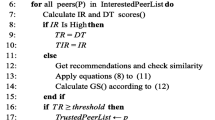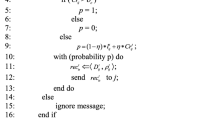Abstract
As more and more P2P applications being popular in Internet, one of important problem to be solved is inspiring users to cooperate each other actively and honestly, the reputation mechanism which is a hot spot for P2P research has been proposed to conquer it. Because of the characters of virtuality and anonymous in the network, it is very easy for users with bad reputations to reenter the system with new identities to regain new reputations in the reputation systems. In order to get rid of the impact of whitewashers and improve the system performance and efficiency, we propose a new probability-based adaptive initial reputation mechanism. In this new mechanism, newcomers will be trusted based on system’s trust-probability which can be adjusted according to the actions of the newcomers. To avoid the system fluctuating for actions of a few whitewashers, we realize the new reputation mechanism in system with group-based architecture, which can localize the impact of whitewashers in their own groups. Both performance analysis and simulation show that this new adaptive reputation mechanism is more effective.
This work was supported by 973 Project granted 2003CB314806 and NFSC granted 90204003, and partly supported by 973 Project granted 2006CB701306.
Access this chapter
Tax calculation will be finalised at checkout
Purchases are for personal use only
Preview
Unable to display preview. Download preview PDF.
Similar content being viewed by others
References
Gnutella Protocol Development, http://rfc-gnutella.sourceforge.net/
BitTorrent software, http://www.bittorrent.com/
Skype software, http://www.skype.com/
Gummadi, K.P., Saroiu, S., Gribble, S.D.: A Measurement Study of Peer-to-Peer File Sharing Systems. In: Proceedings of Multimedia Computing and Networking, San Jose, CA, USA (January 2002)
Adar, E., Huberman, B.A.: Free Riding on Gnutella, October 2000. First Monday (2000)
Friedman, E., Resnick, P.: The Social Cost of Cheap Pseudonyms. Journal of Economics and Management Strategy 10(2), 173–199 (1998)
Chuang, J.: Designing incentive mechanisms for Peer-to-Peer systems. In: 1st IEEE International Workshop on Grid Economics and Business Models (2004)
Feldman, M., Papadimitriou, C., Chuang, J., Stoica, I.: Free-riding and whitewashing in Peer-to-Peer systems. In: ACM SIGCOMM 2004 Workshop on Practice and theory of incentives in networked systems, PINS (2004)
Krishnan, R., Smith, M., Tang, Z., Telang, R.: Virtual Commons: why Free-Riding can be Tolerated in Peer-to-Peer Networks. In: Workshop on Information Systems and Economics (December 2003)
Zhang, X.Y., Zhang, Q., Zhang, Z.S., Song, G., Zhu, W.W.: A construction of locality-aware overlay network: mOverlay and its performance. IEEE JSAC (January 2004)
Yang, J., Zhong, Y.P., Zhang, S.Y.: An Efficient Interest-Group Based Search Mechanism in Unstructured Peer-to-Peer Networks. In: Proceedings of the 2003 International Conference on Computer Networks and Mobile Computing (2003)
Asvanund, A., Bagla, S., Kapadia, M.H., Krishnan, R., Smith, M.D., Telang, R.: Intelligent Club Management in Peer-to-Peer Networks. In: Workshop on Economics of Peer-to-Peer Systems (June 2003)
Clark, D.D., Wroclawski, J., Sollins, K.R., Braden, R.: Tussle in Cyberspace: Defining Tomorrow’s Internet. In: ACM SIGCOMM 2002 (August 2002)
Xue, G.T., You, J.Y., Jia, Z.Q.: An Interest Group Model for Content Location in Peer-to-Peer systems. In: Proceedings of the IEEE international Conference on E-Commerce Technology for Dynamic E-Business, CEC-East 2004 (2004)
Wang, Y., Vassileva, J.: Trust and Reputation Model in Peer-to-Peer Networks. In: Peer-to-Peer Computing (September 2003)
Oram, A. (ed.): Peer-to-Peer: Harnessing the power of disruptive technologies. O’Reilly& Associates, Sebastopol (2001)
Author information
Authors and Affiliations
Editor information
Editors and Affiliations
Rights and permissions
Copyright information
© 2005 Springer-Verlag Berlin Heidelberg
About this paper
Cite this paper
Sun, L., Jiao, L., Wang, Y., Cheng, S., Wang, W. (2005). An Adaptive Group-Based Reputation System in Peer-to-Peer Networks. In: Deng, X., Ye, Y. (eds) Internet and Network Economics. WINE 2005. Lecture Notes in Computer Science, vol 3828. Springer, Berlin, Heidelberg. https://doi.org/10.1007/11600930_65
Download citation
DOI: https://doi.org/10.1007/11600930_65
Publisher Name: Springer, Berlin, Heidelberg
Print ISBN: 978-3-540-30900-0
Online ISBN: 978-3-540-32293-1
eBook Packages: Computer ScienceComputer Science (R0)




